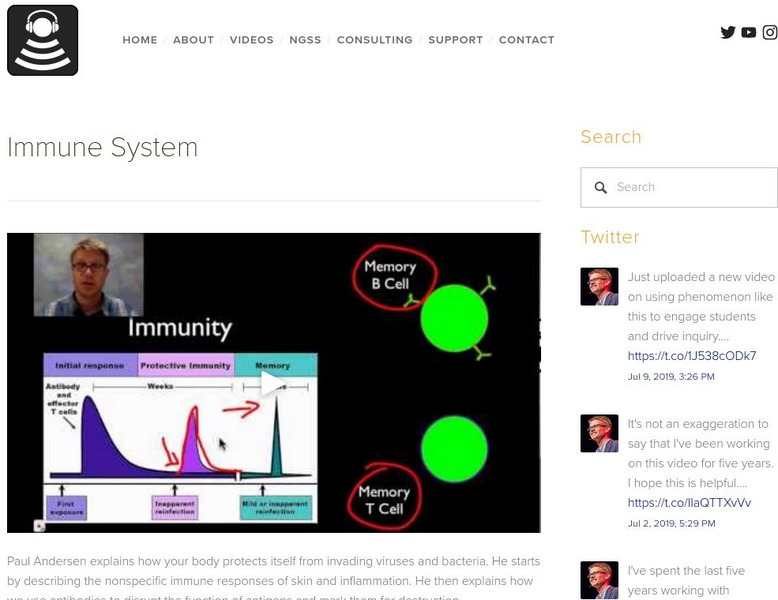Be Smart
Could You Be Immune to Everything?
Could super immunity be the next big super power? Discover the amazing inner workings of the immune system through an engaging video from an interesting science playlist. Animated antibodies take on a variety of pathogenic invaders while...
FuseSchool
What Are White Blood Cells?
White blood cells are our body's tiniest warriors! How do they work? Biology scholars discover the types and functions of white blood cells through a video from an intriguing biology playlist. The resource profiles both types of white...
American Chemical Society
Why Do We Get Allergies?
Allergies are really just mistakes our immune system makes—and we pay the itchy, watery price! An ACS Reactions lesson outlines the immune response to pollens and other allergens. When the body mistakes these allergens for germs, it...
Kurzgesagt – In a Nutshell
The Immune System Explained I—Bacteria Infection
You are under attack! Every second of your life bacteria, viruses, and more attempt to enter your body. The video explains your immune system and the extremes your body goes through to keep you alive.
MinuteEarth
Why Are There Dangerous Ingredients In Vaccines?
How does a cocktail of aluminum, formaldehyde, and an infectious disease keep you healthy? Science scholars explore the composition and role of vaccines in a short video that explains how vaccines interact with our immune systems, why...
Veritasium
Why Do Venomous Animals Live In Warm Climates?
Why do warm, tropical environments seem to be the perfect place to find so many of the world's most venomous animals? Explore several theories in an interesting video. The narrator differentiates between venomous and poisonous, describes...
Crash Course
Immune System (Part 2)
Scientists are creating an experimental vaccine for the Ebola virus, which in clinical trials, is working. Such vaccines are the topic of a video about the adaptive immune system. The narrator discusses how a body reacts to...
SciShow
Should You Use Hydrogen Peroxide to Clean Wounds?
Many families use hydrogen peroxide to clean wounds, but should they? The presenter explains the science behind antiseptics. His conclusion, based on the science, is that we should use water and maybe a little soap to clean any wound.
SciShow
How To Make Antivenom
You are nine times more likely to die from a lightning strike than a snakebite, thanks to anti-venom. But where does anti-venom come from? Viewers follow the process of making anti-venom, beginning with the discovery of how to make it...
Bozeman Science
Blood Types
Young scientists learn the importance of knowing blood types and their compatibility. The instructor in the video explains each type of blood and their antigens and antibodies, and then differentiates between AB blood and Rh blood...
Bozeman Science
Immune System
Flu vaccines work by calling on the immune system to produce antibodies against the virus without actually infecting the individual with the flu. Here class members see how a virus enters cells and the body defends itself. The...
Crash Course
Your Immune System: Natural Born Killer
Being too clean can inhibit your immune system from functioning properly, thus it is possible that washing your hands too much can actually make you sick. Pupils explore the difference between innate and acquired immunity with a...
TED-Ed
Why Do Blood Types Matter?
Here is a fascinating video that explores the genetic implications of our blood types as humans, how we can determine an individual's blood type based on cell alleles, the RH factor, and how blood types can mean life or death for those...
Curated OER
3D Medical Animation: Antibody Immune Response
Enhance your science lesson on the immune system with this short video. It presents a 3D-animation of an antibody immune response. This is a great video to watch multiple times: all the way through, and then again while pausing and...
Khan Academy
Khan Academy: Biology: B Lymphocytes
The role of B lymphocytes and their function in the humoral immune response. [14:13]
Other
It's Okay to Be Smart: Why Vaccines Work
A history of vaccines and how they work to eliminate disease is given in this video. [7:22]
Bozeman Science
Bozeman Science: Immune System
Paul Andersen explains how your body protects itself from invading viruses and bacteria. He starts by describing the nonspecific immune responses of skin and inflammation. He then explains how we use antibodies to disrupt the function of...
Khan Academy
Khan Academy: B Lymphocytes (B Cells)
Overview of B cells (B lymphocytes) and how they are activated and produce antibodies. [14:13]
Khan Academy
Khan Academy: Vasculitis Pathophysiology
Vasculitis occurs when antibodies (part of the immune system of the body) accidentally mistake the proteins on blood vessels to be foreign. The immune system attacks the blood vessel cells and damages them. Learn how fibrinoid necrosis...
PBS
Pbs Learning Media: Nova: Vaccines: Calling the Shots: Immunity & Vaccines
Learn how vaccines help the immune system protect people against diseases in this video. [3:37] The immune system is a natural defense system that uses biological processes to fight invaders such as germs. Vaccines introduce a weakened...
Khan Academy
Khan Academy: Temporal Arteritis
Temporal arteritis (otherwise known as giant-cell arteritis) is a type of vasculitis that affects medium to large arteries in the head. Patients with temporal arteritis can have symptoms like migraines and sudden vision problems. Learn...
Science Friday Initiative
Science Friday: Of Genes and Antibodies
Researchers say they've identified the gene that tells the body to produce one type of immune antibody.
Sophia Learning
Sophia: Antibody Mediated Immunity (Humoral Immunity): Lesson 1
This lesson will investigate an antibody-mediated immune response. It is 1 of 3 in the series titled "Antibody-Mediated Immunity (Humoral Immunity)."
Sophia Learning
Sophia: Vaccines: Lesson 2
This lesson will explain how vaccines can be used to assist the body in producing antibodies towards certain diseases. It is 2 of 10 in the series titled "Vaccines."























